英语:unit1 lesson3 a volunteer teacher教案
高中英语 unit1 lesson3 a volunteer teacher教案 北师大版必修1

Lesson 3 A Volunteer TeacherTeaching aims:To listen for specific factsTo give opinion about voluntary workTo talk about future arrangements and intentions, using the Present Simple, the Present Continuous and going toTeaching difficulties:To talk about future arrangements and intentions, using the Present Simple, the Present Continuous and going toTeaching Aids: computer and cassetteTeaching procedures:Ⅰ. SpeakingT: What does the girl do?S:T: Yes she is a volunteer teacher. This is a real story. The girl’s name is Wang Shu, grew up in Hangzhou, Zhejiang Province. Upon graduation from the English department of Beijing Normal University, she left Beijing for Inner Mongolia working as a volunteer teacher. She is still there now. What do you know about this part of China?S:T: show a slide to introduce Inner Mongolia (Inner Mongolia (Nei Mongol) is the first national autonomous region established in China. It stretches along China's northern border with Mongolia and Russia and covers an oblong area of over 1.28 million square kilometers, one eighth of China. Of all the Chinese provinces and autonomous regions, Inner Mongolia is the third largest after Xinjiang and Tibet.) Inner Mongolia falls behind developed areas soit needs volunteers go to work there.T:What can you say about the girl in the photo?S:Ⅱ ListeningStudents read the questions and predict the answersT: I think you must be interested in Wang Shu, now listen to the interview, you will learn more about her and answer these questions.Students listen to the tape and check their predictions.Students listen to the tape again and make sure of the answersStudents work in pairs and take turns to retell Wang Shu’s storyⅢ Voice your opinionIs it a good idea to do voluntary work? What reasons do people have for doing voluntary work?Ⅳ VocabularyDo the exercise 5.Students work individually, thinking about the cues and what they are going to do.Students read the sentences, decide which words to use, and then complete the sentences.Ⅴ GrammarDo the exercise 6Listen to the interview again. Pay attention to these sentences from the interview. What verb forms are used to talk about the future?Guide students to draw the following conclusion:present Simplepresent Continuousgoing to + infinitivedo consolidate exercise7, 8and 9explain further grammar:Expressing future arrangements and intentions:be going to-- to express an intention to do something.Present Continuous-- to talk about future events that we have already fixed or arranged.Present Simple-- to talk about official events or timetables which we cannot change.be going to do 与 be doing 的区别be going to do 表示事先经过考虑过,然后计划好将做某事;迹象将发生某事。
高中英语北师大版必修一 Lesson 3 A Volunteer Teacher精讲和练习(有答案

【Lesson 3 A Volunteer Teacher】1.Volunteer:n.志愿者v.自愿(做某事)volunteer to do sth.(志愿做某事)volunteer for sth.(志愿为某事效劳)【例题解析】(1)Schools need (volunteer) to help children to read.(2)Why do you want to volunteer our organisation?(3)He volunteered (do) the stressful job.答案:volunteers for to do2.graduatevi.毕业graduate from+学校graduate in+专业n.毕业生【例题解析】Jackie has been devoted to voluntary work since he (graduate) from school.The reason why he’s happy is that he is graduating physics Cambridge University.Top (graduate) from universities are welcomed by major companies.答案:graduated in,from graduates3.challengen.挑战a challenge of: 一个......的挑战v.挑战challenge sb. to sth. 向某人挑战某事challenge sb. to do sth.向某人挑战某事【例题解析】(1)Exploring outer space is a challenge, I guess, man against nature.(2)He challenge me (play) another tennis game.(3)I challenge him a game of chess.答案:of to play to4.support:n.支持支撑in support of 支持with the support of sb. 在某人的支持下v.支持支撑support oneself 自食其力【例题解析】(1)A number of graduates went into schools support of thecause of education.(2)Since he is an adult, he is trying his best to support (he)答案:in himself5.designbe designed for 打算做......用be designed as 被设计成...be designed to do 被设计用于做某事by design=on purpose 故意地6.重点句式你觉得...怎么样?What:What do you think of...?How:How do you feel about...?How do you like...?How do you find...?【例题解析】一、单句语法填空(1)How do you feel about not (take) the children out?(2)What do you think store shopping in the future?(3)do you like your visit to Mount Huang?二、一句多译你认为让他解决这个问题怎么样?asking him to solve the problem?asking him to solve the problem?asking him to solve the problem?asking him to solve the problem?答案:taking of How7.本节语法一般将来时(1)will/shall+do(2)be going to do(3)be to do:你的计划注定要失败:Your plan a failure. (4)be about to do: 就要做正要做飞机就要起飞了:The plane take off.(5)现在进行时表示将来:动词多是位置移动的词:come fly leave arrive等。
北师大版必修1unit1lesson3AVolunteerTeacher学案设计

Unitl Lifestyles-Lesson3 A Volunteer Teacher一、学习目标了解一般现在时、现在进行时与一般将来时的不同用法.二、重难点分析正确使用一般现在时、现在进行时与一般将来时.三、学习过程Step1:词汇讲解1.volunteer(1)志愿者n. He works as a volunteer.(2)v.自愿地或无偿地给予或提供(帮助建议)I volunteered to act as his guide.我自愿当他们的向导.2.graduate vi.毕业& n.毕业生n.毕业graduation试写短语:从…毕业graduate from3.challenge n. &v.挑战adj.具有挑战性的challenging4.support(课文原句)His idea to organize a big party has won support from his friends.n. win/obtain/get support from/of sb. 得至V某人的支持lend /give/offer support to sb. 支持某人come to one ' s suppo椅某人in support of 为了支持v.支持,扶持,赞成,拥护,供养The majority of people in the town strongly support the plan to build a playground for children. He worked hard to support his family.5.solve vt.解决,解答n. solution短语译:解决问题solve a problemthe solution to the problem 问题的解答Step2.知识详解一般现在时1.表客观真理,科学事实,格言及其它不受时间限制的客观存在.a.The earth moves around the sun.b. A rolling stone gathers no moss 〔青苔〕.流水不腐.2.表经常习惯性动作.a.Father doesn ' t smoke.b.He always sleeps with his windows open.3.表现在的行为或状态.a.Someone ' s at the door.b.What ' s the matter with you?4.表主语所具备的特点,特征或水平.Tom speaks good English.5.常用于时间、条件、让步状语从句,表将来,即经常说到的主将从现.a.If it is fine tomorrow, we ' ll go to the countryside.b.We ' ll go out for a wklas soon as the rain stops.6.用于根据规定或时间表预计要发生的动作,只限于go, come, leave, start, stay, begin, close, open 等动词.a.The train leaves at 7 : 30 this evening.b.The term starts on 23rd August.现在进行时be doing用以表达现在〔或现阶段〕正在发生或进行的动作.1.表说话的时刻正在发生或进行的动作.He is watching TV now.2.表目前一段时间内正在进行的动作,说话时动作未必正在进行.Mr. Green is writing a novel these days.3.与频度副词、连词always , continually, forever, constantly, all the time 等连用,带有感情色彩,多半表示说话人不满情绪、惊讶或赞赏等感情色彩.a.She ' s always borrowing money and forgetting to pay me back.b.He is always thinking of others.4.用于go, come, leave, start, arrive , return 等以及die, marry 等等动词中,表示将来发生的动作.a.He is coming to see you tomorrow.b.She is leaving for London soon.5.用于动词get, grow, become, turn, begin, go 等表渐变.a.The leaves are turning red.b.It ' tinjpwarmer and warmer.一般将来时1.一般现在时表将来时(1)主要用于表示根据规定、时间表预计要发生的.a.She retires next month.b.Christmas falls on a Thursday this year.(2)用于时间、条件、让步状语从句表将来.I ' ll give it to you after he comes.2.be to do表将来(1)表预先安排好的方案或约定.a.There is to be a concert on Saturday evening.b.The exhibition is to start in a week ' s time.(2)表说话人的意志、意图、责任、义务、命令.a.You are to finish your work before supper.b.No one is to leave the room without permission.3.be doing现在进行时表将来时,表方案、安排即将发生的动作,常用于位置移动的词: go, come, leave, start, arrive, return 等以及die, marry 等.a. What are you doing tonight?b. We are starting the work in a few days.4.be going to ( +动词原形)表将来.(1)表决定或意图要做的事,有打算〞之意.a.How long is he going to stay here?b.We are going to have a meeting today.(2)根据迹象说明将要发生的动作.a.It is going to rain.b.She is going to have a baby.5.shall/will 表将来.shall常用于第一人称在陈述句中表将来, will用于所有人称表将来.多表示单纯的将来或意愿式的将来,will还可表示临时决定之将来.a.He will be here in half an hour.b.— Tom is in hospital.—I don ' t know. I ' ll go to see him.6.be about to do sth.=be on the point of doing sth.表客观即将、马上要进行的动作,一般不与具体时间状语连用.The train is about to leave.常构成句式:•• be about to do sth. When •••.四、同步练习单项选择.1.Every few years , the coal workers their lungs X- rayed to ensure their health.A.are havingB.haveC.have hadD.had had解析:句意为:每隔几年,煤矿工人们都要对肺部进行X光检查,以保证身体健康.考查动词的时态.根据every few years每隔几年)可知动作是经常性的,有规律的,所以用一般现在时.答案:B2.The church tower which will be open to tourists soon. The work is almost finished.A.has restoredB.has been restoredC.is restoringD.is being restored解析:句意为:教堂的钟塔正在修复,不久就会对游客开放.修复工作差不多完成了.考查动词的时态和语态.根据语境,主语tower和动词restore之间是被动关系,A、C两项被排除;又由句意可知修复工作还未完成,而是正在进行中, 所以不能使用现在完成时,要用现在进行时态.答案:D五、自我测评选择题.1.I ' ll go with you as soon as I my work.A.will finishB.shall finishC.finishD.finished解析:as soon as引导的时间状语从句中用一般现在时表示将来.答案:C2.I have bought some bricks and I a house with them.A.am going to buildB.am buildingC.have builtD.shall build解析:be going to表示现在打算〔在最近或将来〕要做某事,常表示已经做了准备或表示非常可能发生.will/shall do表示未事先考虑,即说话时临时想到的.答案:A六、小结通过本节课的学习,要正确使用一般现在时、现在进行时与一般将来时.。
2019-2020年北师大版高一英语必修1:1.3+A+volunteer+teacher+教学设计

Unit1 Life choicesLesson3 A volunteer teacher教学设计主题语境:人与社会——社会服务与人际沟通—公益事业与志愿服务语篇类型:新闻报道语篇研读:该文讲述了大学生张天违背父母意愿,只身前往贵州偏远山区支教。
在面对学校基础设施及居住环境恶劣的情况下,张天积极努力找到解决办法,不仅使学校基础设施、学生学习及村民的生活都有了很大的变化,而且也赢得了学生和村民的尊敬。
文章重点词汇主要涉及学校生活。
如:get a teacher’s certificate, an eager heart, unstable water and power supplies, organise the first ever concert ,become confident in learning .该文是一篇人物报道,采用倒叙的方式,开门见山描述了张天支教寻常的一天。
通过对比张天支教前后学校,学生生活,及村民生活的变化,沿着张天对支教的情感和态度的变化这两条主线,探讨了人们对公益事业与志愿者服务的态度。
这两条主线相互交织,把语篇的事实性信息,语言表达方式及对张天支教态度的探讨有机整合在一起,由此梳理出本文的信息结构图和结构化知识图。
作者希望通过本文引发人们对公益事业与志愿者服务的思考:人们参与志愿者服务及支教等公益事业,在帮助别人的同时,也获得了锻炼自己提高社会活动能力的机会,内心也得到了快乐。
本课结束时,学生能够:语言能力:1通过快速浏览课文对课文主要内容进行预测。
2获取梳理文中描述张天本人及支教的事实性信息。
3比较描述张天支教前后学校,学生及村民生活的变化。
比较张天支教过程中态度和情感的变化。
思维品质:4 评价张天的支教行为并思考是否所有人都会支持他的选择。
学习能力:5通过小组合作,同伴讨论,个人思考,分享自己对公益事业及到贫困山区支教的看法。
比较描述张天支教前后学校,学生及村民生活的变化。
冀教版九年级英语全册Unit1Lesson3教学设计

2.针对学生的个体差异,我计划采取以下措施:
(1)关注学困生:在课堂上给予他们更多的关注和鼓励,帮助他们建立自信,提高学习兴趣。
(2)发挥优秀生的优势:鼓励优秀生与学困生相互帮助,共同进步,营造良好的学习氛围。
2.学生互相交换答案,进行核对和讨论,共同解决问题。
3.教师针对学生的练习情况,进行针对性的讲解和辅导,巩固所学知识。
(五)总结归纳
1.教师邀请各小组分享他们讨论的食物制作过程,让其他同学倾听并学习。
2.教师引导学生总结本课所学的一般现在时和一般过去时描述食物制作过程的技巧,以及重点词汇和短语的运用。
四、教学内容与过程
(一)导入新课
1.教师展示一幅美食图片,引导学生观察并提问:“What's this?”、“How do you think it tastes?”,激发学生对食物的兴趣。
2.邀请学生分享他们最喜欢的食物和制作方法,引导他们用英语进行简单描述,如:“I like pizza. To make a pizza, you need dough, cheese, and various toppings.”
(三)学生小组讨论
1.教师将学生分成小组,每组选择一种食物,讨论并描述其制作过程。
2.各小组用一般现在时和一般过去时进行描述,注意运用本课所学的词汇和短语。
3.教师巡回指导,关注学生的语言表达,给予及时的反馈和鼓励。
(四)课堂练习
1.教师设计一份关于食物制作过程的练习题,包括填空、选择和句子改写等题型,让学生独立完成。
(3)分层教学:根据学生的英语水平,设计不同难度的教学活动,使每个学生都能在课堂上获得成就感。
高一英语《Unit1 Lesson 3 A Volunteer Teacher》
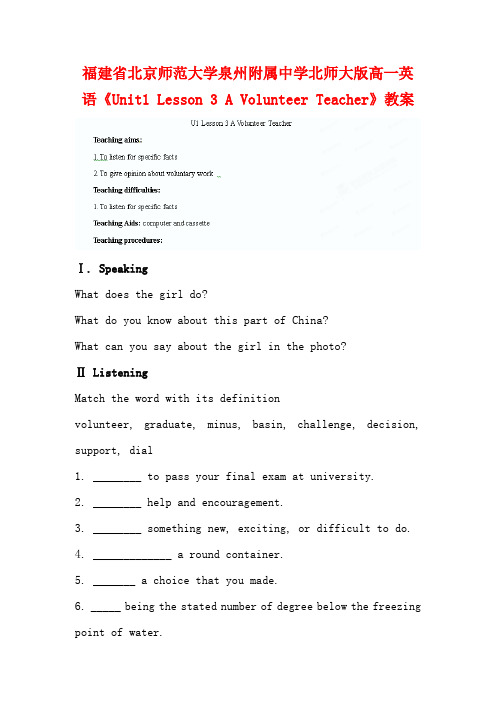
福建省北京师范大学泉州附属中学北师大版高一英语《Unit1 Lesson 3 A Volunteer Teacher》教案Ⅰ. SpeakingWhat does the girl do?What do you know about this part of China?What can you say about the girl in the photo?Ⅱ ListeningMatch the word with its definitionvolunteer, graduate, minus, basin, challenge, decision, support, dial1. ________ to pass your final exam at university.2. ________ help and encouragement.3. ________ something new, exciting, or difficult to do.4. _____________ a round container.5. _______ a choice that you made.6. _____ being the stated number of degree below the freezing point of water.7. ________ someone who do a job without being paid.8. _____ to make a telephone call.Step 1. Listen to the interview and complete the sentences below.General information about Wang ShuVolunteer Wang ShuWhy to go Work as a volunteer_____________.Where to work Inner Mongolia.Whom to help ______________.Step 2 Section 1:Wang Shu feels ____________- .Step 3 Section 2:Q1: Why did she make the decision?She feels i t’s her______________ to do something for students.She enjoys____________ new challenges.Q2: What is life in Inner Mongolia?It is very _____and she only has a small room with a bed and a basin to ___ up with.Step 4 Section 3:1.At first her parents _________ her decision.2.After a long talk, she won their ______________.3.When is Wang Shu leaving?The train _______ at 9 tomorrow morning.4.How to contact(联系) Wang Shu?If you have any questions for Wang Shu, dial ___________Ⅲ Voice your opinionIs it a good idea to do voluntary work? What reasons do people have for doing voluntary work?Ⅵ Homework:1.dictation。
北师大版高中英语必修1 Unit1_Lesson3_名师课件

WS: Well, I’ve jusgtr_a_d_u_a_t_e_d___ from university. As a teacher, I feel it’s my duty to do something for students in poor areas.
4. What is she going to do in Inner Mongolia? She’s going to teach middle school students.
5. What do her parents think of her decision?
They felt shocked when they first heard about her plan. They were strongly against it. But now they support it.
I: I’m sure your parentas_re__p_r_o_u_d__o_f __you, and I believe you’re going to have anex_c_i_t_in_g___ year. We’re going to open ourp_h_o_n_e__li_n_e_s__ now. If you have any questions for Wang Shu, dial 5556782 and she’ll answer them for you.
高一北师大版模块一
Unit 1 Lifestyles
最新北师大版高一英语必修一教案第1单元第3课(整理版)

新课标教材北师大版必修模块1李海英、凌蕙、程岚、Unit 1 LifestylesLesson 3 A Volunteer TeacherPeriod 1 Listening and speaking课堂设计设计原则本课时采取了“准确简洁、实用可学”的设计原则,侧重常态教学。
设计重点聚焦在以下两方面:学生活动的活动数量和质量;课堂的起伏和流畅。
模式新课标下的学生主体参与及合作学习目标1. 学生能够抓住语段中的关键词,理解主旨大意。
2. 学生能够了解采访的形式及简单应用。
教学内容1.了解志愿者Wang Shu的信息。
2.介绍采访的形式,结合志愿者话题加以应用。
教学重点1. 在使用中掌握词汇和句型。
2. 主要技能训练:听说写教学难点学生掌握词汇和句型并应用。
语言焦点volunteer, graduate, minus, basin, challenge, decision, support, be excited about; enjoy meeting new challenges;I’d like to do/work as…I feel it’s my duty to …能力猜测、理解、归纳、应用、教法1. 任务驱动,逐层递进2. 集体参与,小组合作,小组展示教学步骤《两位数乘两位数笔算乘法》(不进位)评课稿王玉妹老师十分关注学生已有的知识和经验,精心设计各项活动,从激活学生已有的知识和经验开始,组织学生开展探索、尝试、交流、实践多种活动,全课教学活动中有以下特点:1、复习导入中创造良好的认知准备状态。
一般说来,课堂上学生的学习达成度与学生的认知准备状态直接相关。
两位数乘两位数的笔算与两位数乘一位数在算理上是一致的,所不同的只是一个因数由一位数变成了两位数,由此,王老师设计安排了丰富的复习活动,激活学生已经掌握的口算、笔算的知识和经验。
这里特别突出了笔算,既指定学生报演,又要求每个学生在练习本上算一算。
高一Unit1lesson 3 a volunteer teacher
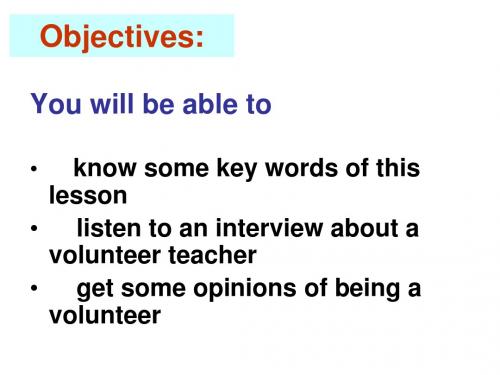
finally : support
Your opinion
?
Listen again
Ask and answer questions (pair work) p12
Voice your opinion
Is it a good idea to do voluntary work? What reasons do people have for doing voluntary work?
Name Wangshu Where Why to What to Parents’ Your to go go there do there reaction opinion
Where to go ? Why to go there? ?
in a small country town in Inner Mongolia
Objectives:
You will be able to
know some key words of this lesson • listen to an interview about a volunteer teacher • get some opinions of being a volunteer
She thinks it is her duty to do something for students in poor areas. What to do there? Teach middle students. She has ? many lesson plans to make and homework to mark. Parents’ reaction First: dislike
“ Each contribution — no
北师大版高中英语必修1Unit1教案Lesson 3
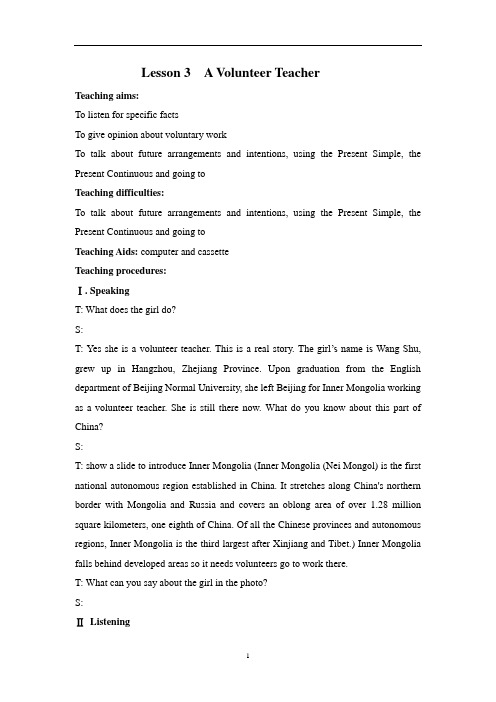
Lesson 3 A Volunteer TeacherTeaching aims:To listen for specific factsTo give opinion about voluntary workTo talk about future arrangements and intentions, using the Present Simple, the Present Continuous and going toTeaching difficulties:To talk about future arrangements and intentions, using the Present Simple, the Present Continuous and going toTeaching Aids: computer and cassetteTeaching procedures:Ⅰ. SpeakingT: What does the girl do?S:T: Yes she is a volunteer teacher. This is a real s tory. The girl’s name is Wang Shu, grew up in Hangzhou, Zhejiang Province. Upon graduation from the English department of Beijing Normal University, she left Beijing for Inner Mongolia working as a volunteer teacher. She is still there now. What do you know about this part of China?S:T: show a slide to introduce Inner Mongolia (Inner Mongolia (Nei Mongol) is the first national autonomous region established in China. It stretches along China's northern border with Mongolia and Russia and covers an oblong area of over 1.28 million square kilometers, one eighth of China. Of all the Chinese provinces and autonomous regions, Inner Mongolia is the third largest after Xinjiang and Tibet.) Inner Mongolia falls behind developed areas so it needs volunteers go to work there.T:What can you say about the girl in the photo?S:ⅡListeningStudents read the questions and predict the answersT: I think you must be interested in Wang Shu, now listen to the interview, you will learn more about her and answer these questions.Students listen to the tape and check their predictions.Students listen to the tape again and make sure of the answersStudents work in pairs and take turns to retell Wang Shu’s storyⅢVoice your opinionIs it a good idea to do voluntary work? What reasons do people have for doing voluntary work?ⅣVocabularyDo the exercise 5.Students work individually, thinking about the cues and what they are going to do. Students read the sentences, decide which words to use, and then complete the sentences.ⅤGrammarDo the exercise 6Listen to the interview again. Pay attention to these sentences from the interview. What verb forms are used to talk about the future?Guide students to draw the following conclusion:present Simplepresent Continuousgoing to + infinitivedo consolidate exercise7, 8and 9explain further grammar:Expressing future arrangements and intentions:be going to-- to express an intention to do something.Present Continuous-- to talk about future events that we have already fixed or arranged.Present Simple-- to talk about official events or timetables which we cannot change.be going to do 与be doing 的区别be going to do 表示事先经过考虑过,然后计划好将做某事;迹象将发生某事。
北师大版高中英语必修第一册Lesson 3

UNIT-1 Life ChoicesLesson-3 A volunteer teacher教学设计本节课是高中英语第一册Unit 1 Life Choices的第三课A volunteer teacher,课型是阅读课,介绍了一位叫做张天(译音)的大学毕业生,在偏僻地区做志愿者教师的故事。
通过本节课的学习,让学生学会如何描述一段成为志愿者的经历,如何表达个人感受以及如何用英语表达从事志愿者过程中的细节描写。
1.语言技能目标(1)学生能够借助关键词,在理解文章大意的基础上,找出段落主题句,完成读前问题;(2)用所学的词汇和语言的对课文进行复述。
2.语言知识目标(1)能够正确运用以下单词和短语:inspire, independently, apply for, imagine, live up to, flash, deal with, be responsible for, attractive, as well as, fist ever, satisfied, treat sb as...;(2)能掌握-ed/-ing形容词表达对物或人的修饰。
3.文化意识目标(1)了解英语交际中如何根据对方的话语作出恰当的反应;(2)了解志愿者工作的辛苦以及学生对志愿者事业的思考。
4.情感态度目标热爱志愿者活动,积极参与不同的志愿者活动,从中学会如何克服困难,如何与人际交往,在新环境中进一步树立准确的语言学习观。
1.重点(1)如何使用地道的英语介绍志愿者活动;(2)正确理解并运用-ed/-ing形容词的修饰对象。
2. 难点(1)能用得体的英语表达自己从事志愿者活动的细节、个人情感;(2)能正确识别-ed/-ing形容词的修饰对象并准确使用。
2019年北师大版高中英语必修一Unit1 《Lesson 3 A Volunteer Teacher》 Listening and speaking 课件 共41

Further thingking.
volunteer, graduate, minus, basin, challenge, decision, support, dial
1. It can get as cold as _m_i_n_u_s__ 40 or 50 degrees at night.
2. Kate _g_ra_d__u_a_te_d_ from medical school last year and she is working in a big hospital now.
In short,
Each contribution — no matter how small — can make a difference.
Previous Secretary General of the UN ----Annan 安南
Let's get moving !
Learn them by your heart:
•At first, her parents didn't like this idea.But Wang Shu finally won their support after ___h_a_vi_ng(have) a long talk with them.
•Now she is prepared for her job.
Write a composition about your plan about how to help the children in the poor areas.
北师大版必修1 unit 1 lesson3 A Volunteer Teacher 教案

Module One Unit One A Volunteer Teacher一、概述Though the language focus of this lesson is on listening, I place stress on the spirit ofvolunteering. Thus, firstly, I will give the definition of volunteering and four basic forms of it to students, so that they will have deep understanding of it and contribute their own services in the future. Secondly, I will deal with the new vocabulary to make it easier to understand the listening material. Thirdly, Exercise 3 will be turned into two easier exercises. As a result, students will be able to understand the interview gradually.课时安排:1课时。
二、教学目标分析知识目标:1.Learn new words and expressions concerning the topic volunteering.2.To know what an interview is like.3.Get the general idea about volunteering.能力目标:1.Listen to get the general idea of the conversation2.Listen carefully to get specific information.3.Be able to talk about future arrangements and intentions.情感、态度与价值观目标:1.Help students know that it’s our great honor to help others.2.Encourage students to contribute their services to our society in the future.3.Make students respect any volunteers in our society.三、学习者特征分析On the one hand, since most of the students come from cities. This topic is quite suitable for them. The interviewee, Wang Shu, in the listening material is a graduate student from Beijing, but she made a big decision to be a volunteer teacher in Inner Mongolia. She has set a good example to students living in cities. On the other hand, the listening material in thislesson is much too difficult for students who are just in the early days of their Senior High School. So I change the material into two easier ones to encourage their confidence inlistening.四、教学策略选择与设计1、Task-based teaching and learningIt will help students to be active in the class and make them sure what to do in the class. The teacher just acts as a guide.2、Discussion and cooperationDiscussion will make students exchange ideas, learn from each other and study the best way to express themselves. While cooperation can help students learn how towork with others and improve their learning procedures.五、教学资源与工具设计1、the multi-media teaching equipment六、教学过程Step One : lead-inTask One: ask students the following question:How much do you know about volunteer? Please discuss it with your group members.Background information: Volunteering is generally considered an altruistic activity, intended to promote good or improve human quality of life but people also volunteer for their own skill development, to meet others, to make contacts for possible employment, to have fun and a variety of other reasons that could be considered self-serving.Aim: to inform students of the concept of volunteering; involve students into the topic.Task Two: discuss with your partner: in what aspects can you volunteer in our society?Put forward four forms of volunteering with some pictures.Forms of volunteering:1.Help people in poor conditions: children in poor conditions; people who have AIDS; peoplewho suffer from disasters (flood, earthquake, war). You can provide medicine; education;emergency rescue.2.Self-serving: big sports events; Olympics; world Expo; business exposition.munity service: neighborhood; church; community groups; school; hospital.4.Environment5.AnimalsTask Three: please share your own experience of volunteering with your group members and the teacher.T: have you ever volunteered for our society? If possible, I hope all of you can make a contribution to our society, however small it may be.Step Two: Pre-listeningTask One:Listen to the tape of vocabulary of Lesson 3, ask students to read following the tape.Aim: to have the basic meaning of the vocabulary.Task Two: please finish Exercise Five on Page 12.Aim: to enable students to use the new vocabulary.Step Three: While-listeningTask One: listen to the interview and fill in the blanks.1)Wang Shu, tell us about your ______, please.2)But why did you _____ _____ ___________?3)----Well, I’ve just ____________ ________university. As a teacher, I fell it’s my ______todo something for students in _______areas.4)But life in Inner Mongolia is very hard and quite different from that in Beijing. Are you______________ __________ that?5)So, teaching in Inner Mongolia is going to be a great __________for me. Maybe it will bevery cold and maybe I’ll only have a small room with a bed and a _____ to wash up with but I r eally enjoy ________________ _______ ______________. That’s why I made the decision to go.6)What do your parents think of your plan? Do they ________ you ?7)----To tell you the truth, they didn’t like the idea when they first heard about my plan. But wehad a long talk, and I finally _______ _______ _____________.Aim: this exercise has reduced the difficulty of listening for students. And it will help them get the general idea of the interview.Task Two: listen again and decide which is true or false.1)She’s going to work as a volunteer teacher in a big country town in Inner Mongolia2)She is excited about her plan.3)She made this decision because she wants to travel in Inner Mongolia.4)She knows that life in Inner Mongolia is going to be hard.5)She won her parents’ support for the first time.6)Wang Shu will leave at 9 tomorrow morning.Aim: practice the skill of getting specific information when listening.Step Three: Post- listeningTask Two: explain the language points1)volunteer2)Graduate3)Challenge4)Support5)DesignHomework: please finish the exercises of Lesson 3 in the English Weekly Paper.Summary: the lesson has explained what the volunteering work is and has encouraged students to contribute to our society emotionally. It is quite valuable for students in their life.The blackboard design1.Help people in poor conditions:children in poor conditions;people who have AIDS;people who suffer from disasters (flood, earthquake, war).You can provide medicine; education; emergency rescue.2.Self-serving:big sports events;Olympics;world Expo;3.business exposition.munity service:neighborhood;church;community groups;school;hospital.。
高中英语北师大版必修1课件:Unit 1 Lifestyles Lesson 3 A Volunteer Teacher
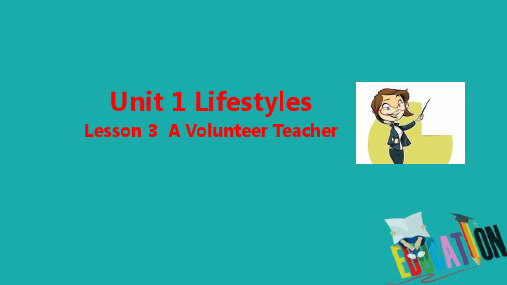
单句写作 (6) These graduates all graduated from (这些大学毕业生都毕业于) the University of Oxford. (7)[词汇复现]The reason why my son hopes to graduate in law (希望毕业于法律 专业) is that he has dreamed of being a lawyer.
词汇五 design vt. & n. 设计
【教材原句】 Lesson:How to design a website 课程:如何设计网站 【要点必记】 (1) design sth. for sth. 为……设计…… be designed for... 打算做……用 be designed to do 被设计用于做;目的是做;计划做 be designed as 被设计成…… (2)by design(=on purpose)有意地,故意地 (3)designer n. 设计师
(3) The young man decided that he should try to earn his own living after _g_r_a_d_u_a_t_i_o_n_ (graduate). (4) [词汇复现]After he graduated from Harvard,he organised a lot of social activities. (5) Top graduates(graduate) from universities are welcomed by major companies.
【误区警示】 support sb. in (doing) sth. 支持/ 赞成某人(做)某事 support sb. by (doing) sth. 通过(做)某事供养某人
中学英语教学设计

新课程中学英语教学设计福建泉州七中郑红莲一.教材内容Target materialModule 1 Unit 1 Lesson 3 A V olunteer Teacher the second period二.教材分析Material Analysis1.Content: T o learn Future Arrangements and Intentions2.Position and function: Following the listening practice ,t he grammar item of this unit isactually a chance for the students to use Present simple,Present continuous and be going to + infinitive to talk about the future.3.T eaching focus: Through listening,discussing ,speaking and writing practice ,enable thestudents to use difference tenses to express their Future Arrangements and Intentions 4.Difficult points: The students may fine it difficult to make the difference between Presentcontinuous and be going to + infinitive to talk about future plans三.学情分析A cademic levelmost of the students are eager to learn so that they usually participate in class activities and make their presentations actively. However, different students have different language levels and different learning styles. Therefore, I divide the whole class into 14 groups(4 in a group), each of which contains students of different levels. In this way, it turns the possible frustration when an individual student makes language mistakes into self-respect of the whole team.The grammar item in this lesson can be used to talk about topics which are close to the students‟ future life. So they show great interest in learning the text. 四.教学目标T eaching goals1. 目标语言Target language1) 重点词句Useful sentencesThe train leaves at 9 o‟clock tomorrow morning.So I am getting up at about 6 to get everything ready.I‟m going to work as a volunteer teacher in a small country town in Inner Mongolia.2)语法Grammar---Future Arrangements and Intentions2.能力目标Ability goalsGet the students to talk and write about their high school plan.五.教学重点T eaching important points1.Enable the students to to talk about Future Arrangements and Intentions2.Help the students to master some useful sentences.六.教学难点T eaching difficult pointsStudents may have difficulty in making the differences between Future Arrangements and Intentions七.教学方法T eaching Methods:Team-work learning, activity-based learning八.教具准备Teaching Aims:a multimedia computer九.教学过程T eaching procedures:Step I. Warm up (5 minutes)“ Spoken English Show ”(This step is designed to warm up the class as well as revise what the students learned in the last lesson.Two students are required to “show” every day.It‟s a regular program of my English class.)T: Now It‟s time for our“Spoken English Show”.Whose turn today? Let‟s welcome!S:….My topic today is:My future plan…(The students use a lot of “be going to + infinitive”to talk about their future plan.)T:What is …going to do after he leaves school?Where is …going to spend his holiday this summer?Step 2 Grammar learning( 30 minutes)(This step is designed to enable the students to use Future Arrangements and Intentions appropriately. First, ask the students to listen to the interviewagain.Pay attention to what verb forms are used to talk about the future. Andthen ask them to discuss and do some exercises.)1. Grammar presentation (10 minutes)T: Today, we are going to deal with the grammar item: Future Arrangements and Intentions.(Exercise 6)First, let‟s listen to the interview about a volunteer teacher we listenedyesterday again.Please focus on what verb forms are used to talk about thefuture.(After listening,ask some students to tell what verb forms are used to talkabout the future,then present the following on the screen.)1).The train leaves at 9 o‟clock tomorrow morning.2).So I am getting up at about 6 to get everything ready.3).I‟m going to work as a volunteer teacher in a small country town in InnerMongolia.T:Which sentence says something about:a)Wang Shu‟s personal arrangement?b) A scheduled event?c)Wang Shu‟s intension to do something?(Ask three students to read out their answers and then draw an conclusionand give more examples.)T: We use:●be going to– to express an intension to do something.I ‟m going to study medicine after school.●Present Continuious- talk about future events that we have already fixed orarranged.I‟ am getting merried in June.My cousin from Australia is coming next week.●Present Simple- to talk about official events or timetables which we cannotchange.The summer term begins on the 15th of February.The train arrives at 6 p.m..T: Look at the following sentences and mark then with a,b,or c to match the types of sentences in Exercise 6.1).The new school term begins the day after I arrive.2).I‟m taking a box of those.3).I‟m going to give some to the students,too.T:Which sentence is to express an intension to do something?S:Sentence 3) I‟m going to give some to the students,tooT: Which is about a scheduled event?S: Sentence 1. The new school term begins the day after I arrive.T: Which sentense says something about one‟s personal arrangement?S: Sentense 2. I‟m taking a box of those.T:Ok .Can you draw a conclusion What verb forms are used totalk about the future?S:1) The Present Continuous is used to express a personal arrangement;2) The Present Simple is used to express official events or timetables which we cannotchange.3) when we express one‟s intention to do sth, we use “be going to”.2. Grammar exercises (20 minutes)1) Do Exercise 8.Write out sentences.(This step is designed to let the students use the Present Simple tense to express official events or timetables which cannot be changed.Have a competition tomotivate the students.)T:Now, let‟s come to Exercises 8.Look at the English language summer camp program.Imagine the organizer telling the group about it.First,please discuss in groups of four and write out as many sentences as you can.I‟ll give you 5 minutes to discuss,after that,I …ll ask each group to report your work.Group1Group2Group3Group42)Do Exercise 9 Make up a story(This step is designed to let the students use be going to + infinitive to talk about one‟s intention to do sth. Have a competition to arise the students‟ interest )T:Now please look at the four pictures on page 13.What are they going to do?S:Picture 1. He is going to play the guitar.Picture 2. He is going to change the tyre.Picture 3. She is going to dance.Picture 4. They are going to have a party.T:It‟s rather easy for you to make up one sentence.Now.I want you to make up one story according to the four picturesI‟ll give you 5 minutes to discuss,then, each group ,please report your story to the class.Let‟s see which group will make up the best story.S: We are going to have a party this Sunday evening.…(The students make up very interesting stories.They are very active in practice themselves.I enjoy their stories with them ,at the same time I can check whether they have mastered how to use be going to + infinitive to talk about one‟s intention .)Step 3 Language in use ( 10 minutes)(This step is designed to let the students use different verb forms to talk about their future plans appropriately. )T: Now, here is a task for you.Since you have just started your senior high school,Y ou must have a lot of plans.Choose from the following and write about one of your plans:●your plan for the next three years●your plan for the coming holiday●your plan for the coming weekend( Let the students discuss in pairs first,then write out their plans.If the students cannot finish in class,they can leave it as their homeworks.)Step 4 HomeworkFinish writing your future plans.十.教学反思如何上好一堂语法课?许多老师都有各种困惑和尝试。
2018版高中英语北师大版必修一学案:Unit1PeriodThreeLesson3AVolunte
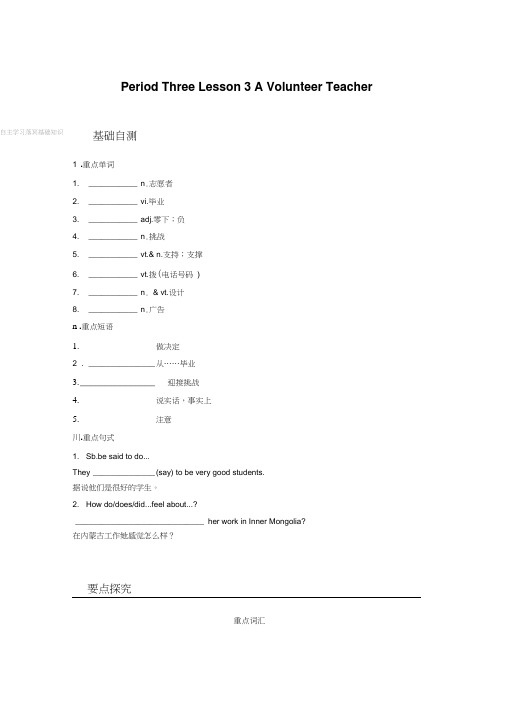
Period Three Lesson 3 A Volunteer Teacher 自主学习落冥基础知识基础自测1 .重点单词1. ___________ n.志愿者2. ___________ vi.毕业3. ___________ adj.零下;负4. ___________ n.挑战5. ___________ vt.& n.支持;支撑6. ___________ vt.拨(电话号码)7. ___________ n. & vt.设计8. ___________ n.广告n .重点短语1. _______________ 做决定2 . _______________ 从……毕业3._______________ 迎接挑战4.______________ 说实话,事实上5.______________ 注意川.重点句式1. Sb.be said to do...They ______________ (say) to be very good students.据说他们是很好的学生。
2. How do/does/did...feel about...?_____________________________ her work in Inner Mongolia? 在内蒙古工作她感觉怎么样?要点探究重点词汇1. Kate graduated from medical school last year and she' s working in a big hospital now. 凯特去年从医学院毕业了,她现在在一家大医院工作。
[归纳拓展](l) graduate v.毕业;n.毕业生graduate from 从 ... 毕业graduate in…毕业于 .. 专业(2) graduation n.毕业;毕业典礼[语境助记](1) My daughter is a university graduate working toward her master ' s degree in English.(2016 天津)我的女儿是一个大学毕业生,正在努力攻读英语硕士学位。
- 1、下载文档前请自行甄别文档内容的完整性,平台不提供额外的编辑、内容补充、找答案等附加服务。
- 2、"仅部分预览"的文档,不可在线预览部分如存在完整性等问题,可反馈申请退款(可完整预览的文档不适用该条件!)。
- 3、如文档侵犯您的权益,请联系客服反馈,我们会尽快为您处理(人工客服工作时间:9:00-18:30)。
Lesson 3 A Volunteer TeacherTeaching aims:To listen for specific factsTo give opinion about voluntary workTo talk about future arrangements and intentions, using the Present Simple, the Present Continuous and going toTeaching difficulties:To talk about future arrangements and intentions, using the Present Simple, the Present Continuous and going toTeaching Aids: computer and cassetteTeaching procedures:Ⅰ. SpeakingT: What does the girl do?S:T: Yes she is a volunteer teacher. This is a real st ory. The girl’s name is Wang Shu, grew up in Hangzhou, Zhejiang Province. Upon graduation from the English department of Beijing Normal University, she left Beijing for Inner Mongolia working as a volunteer teacher. She is still there now. What do you know about this part of China?S:T: show a slide to introduce Inner Mongolia (Inner Mongolia (Nei Mongol) is the first national autonomous region established in China. It stretches along China's northern border with Mongolia and Russia and covers an oblong area of over million square kilometers, one eighth of China. Of all the Chinese provinces and autonomous regions, Inner Mongolia is the third largest after Xinjiang and Tibet.) Inner Mongolia falls behind developed areas so it needs volunteers go to work there.T:What can you say about the girl in the photo?S:ⅡListeningStudents read the questions and predict the answersT: I think you must be interested in Wang Shu, now listen to the interview, you will learn more about her and answer these questions.Students listen to the tape and check their predictions.Students listen to the tape again and make sure of the answersStudents work in pairs and take turns to retell Wang Shu’s storyⅢVoice your opinionIs it a good idea to do voluntary work? What reasons do people have for doing voluntary work?ⅣVocabularyDo the exercise 5.Students work individually, thinking about the cues and what they are going to do. Students read the sentences, decide which words to use, and then complete the sentences.ⅤGrammarDo the exercise 6Listen to the interview again. Pay attention to these sentences from the interview. What verb forms are used to talk about the future?Guide students to draw the following conclusion:present Simplepresent Continuousgoing to + infinitivedo consolidate exercise7, 8and 9explain further grammar:Expressing future arrangements and intentions:be going to-- to express an intention to do something.Present Continuous-- to talk about future events that we have already fixed or arranged.Present Simple-- to talk about official events or timetables which we cannot change. be going to do 与be doing 的区别be going to do 表示事先经过考虑过,然后计划好将做某事;迹象将发生某事。
We are going to go climbing this week.My sister is going to go to Australia in a week.It is going to snow.be doing 指立刻决定的计划,没有经过一段时间的考虑, 意思上相当于be about to do, 但后者不能接时间状语;多用于表示位置移动的动词中,如:go, come, arrive, leave, reach , start;I am going to hometown this afternoon.He is leaving.We are playing the piano at six.I am about to go out.句型转换1. We are going to do some shopping next Tuesday. (变成否定句)We ____________________ shopping next Tuesday.2. I’m going to see my mother on Mothers’ Day. (变成一般疑问句,并作否定回答) —________ going to see your mother on Mothers’ Day?—NO, _________.3. She is going to carry these luggage to the train station. (对划线部分提问)_____ is she going _____?4. Sophie is going to France the day after tomorrow. (对划线部分提问)_______ Sophie ______ to France?Answers: 1.aren’t going to do some 2.Are you, I am not3.What, to do4.When is, going补全对话:A: (1) ________________________tomorrow?B: I'm going to buy a gift.A: (2) ___________________________?B: I'm going to give it to my mother.A: (3)________________________ ?B: I'm going to buy a bunch of flower.A: ___________________________?B: I'm going to buy it in the Flower World.A: Are you going there aloneB: No. (5)__________________________.A: your mother will be happy.Answers:(1) What are you going to do(2)Who are you going to give it to(3)What are you going to buy(4)Where are you going to buy it(5)I’m going there with my sisterTranslate sentences1.我们要两点半出发。
__________________________2.明年我们要去加拿大度假。
——————————————————3. 我将派约翰去帮助你。
______________________________4.约翰和玛丽买了一些家具,他们打算下个月结婚。
____________________________________________.Answers:1.We are going to start at 2:30.2. We are going to take a holiday in Canada next year.3. I’m going to send John to help you.4. John and Mary bought some furniture, they are going to marry next month.ⅥHomework: writingYou have just started your senior high school. You must have a lot of plans.Choose from the following and write about one of your plans:Your plan for the next three years.Your plan for the coming holiday. Your plan for the coming weekend.。
